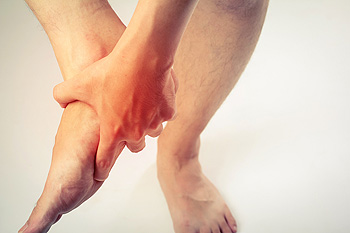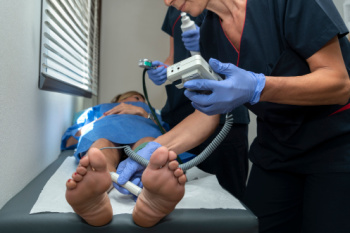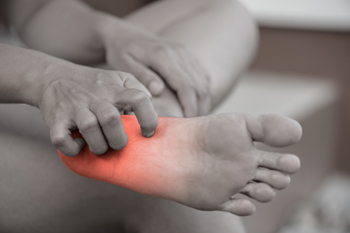Items filtered by date: March 2025
The Possible Causes and Treatments of Plantar Fasciitis

The plantar fascia is a long, thick band of tissue that spans from the heel bone along the bottom of the foot to the toes. The plantar fascia supports the bottom of the feet and toes during walking, running, and jumping. The plantar fascia can become overly stressed or even tear or rupture from overuse or injury, causing pain and inflammation which causes plantar fasciitis. Being obese, standing or working on your feet for prolonged periods of time, or having flat feet or high arches can all contribute to this condition. Additionally, engaging in activities that involve dancing, marching or running can also contribute to, or possibly worsen the symptoms of plantar fasciitis. Wearing certain footwear can also put you at an increased risk of developing this condition such as high heels, flip flops, worn out shoes, or other types of footwear with inadequate support. A podiatrist will use a variety of treatment protocols to treat plantar fasciitis depending upon the severity of the condition and how long the patient has been suffering from it. If you have this kind of foot pain, it is suggested you schedule an appointment with a podiatrist for a diagnosis and appropriate treatment plan.
Plantar fasciitis is a common foot condition that is often caused by a strain injury. If you are experiencing heel pain or symptoms of plantar fasciitis, contact Harris Greenberger, DPM from Fairfield County Foot Surgeons. Our podiatrist can provide the care you need to keep you pain-free and on your feet.
What Is Plantar Fasciitis?
Plantar fasciitis is one of the most common causes of heel pain. The plantar fascia is a ligament that connects your heel to the front of your foot. When this ligament becomes inflamed, plantar fasciitis is the result. If you have plantar fasciitis you will have a stabbing pain that usually occurs with your first steps in the morning. As the day progresses and you walk around more, this pain will start to disappear, but it will return after long periods of standing or sitting.
What Causes Plantar Fasciitis?
- Excessive running
- Having high arches in your feet
- Other foot issues such as flat feet
- Pregnancy (due to the sudden weight gain)
- Being on your feet very often
There are some risk factors that may make you more likely to develop plantar fasciitis compared to others. The condition most commonly affects adults between the ages of 40 and 60. It also tends to affect people who are obese because the extra pounds result in extra stress being placed on the plantar fascia.
Prevention
- Take good care of your feet – Wear shoes that have good arch support and heel cushioning.
- Maintain a healthy weight
- If you are a runner, alternate running with other sports that won’t cause heel pain
There are a variety of treatment options available for plantar fasciitis along with the pain that accompanies it. Additionally, physical therapy is a very important component in the treatment process. It is important that you meet with your podiatrist to determine which treatment option is best for you.
If you have any questions, please feel free to contact our office located in Norwalk, CT . We offer the newest diagnostic and treatment technologies for all your foot care needs.
Methods to Keep Your Feet Healthy

Keeping feet healthy involves simple yet essential daily practices. Washing feet thoroughly helps remove dirt, bacteria, and fungi that may lead to infections. Proper toenail clipping is equally important. Nails cut straight across, rather than rounded, prevent painful ingrown nails and damage to neighboring toes. Wearing comfortable, well-fitted shoes helps prevent common problems like corns and calluses, and lessens pain from bunions by reducing excessive pressure and friction. Examining your feet for any noticeable changes like redness, swelling, or unusual sores allows for early detection of potential issues. Regular foot massages and certain exercises can enhance circulation, reduce inflammation, and relieve sore muscles and joints. A podiatrist plays an essential role in maintaining foot health by identifying problems early, providing specialized advice, and recommending appropriate footwear. If you have foot, toe, or ankle problems, it is suggested that you schedule an appointment with a podiatrist for an exam, diagnosis, and treatment.
Everyday foot care is very important to prevent infection and other foot ailments. If you need your feet checked, contact Harris Greenberger, DPM from Fairfield County Foot Surgeons. Our podiatrist can provide the care you need to keep you pain-free and on your feet.
Everyday Foot Care
Often, people take care of their bodies, face and hair more so than they do for their feet. But the feet are a very important aspect of our bodies, and one that we should pay more attention to. Without our feet, we would not be able to perform most daily tasks.
It is best to check your feet regularly to make sure there are no new bruises or cuts that you may not have noticed before. For dry feet, moisturizer can easily be a remedy and can be applied as often as necessary to the affected areas. Wearing shoes that fit well can also help you maintain good foot health, as well as making it easier to walk and do daily activities without the stress or pain of ill-fitting shoes, high heels, or even flip flops. Wearing clean socks with closed shoes is important to ensure that sweat and bacteria do not accumulate within the shoe. Clean socks help to prevent Athlete’s foot, fungi problems, bad odors, and can absorb sweat.
If you have any questions please feel free to contact our office located in Norwalk, CT . We offer the newest diagnostic and treatment technologies for all your foot and ankle needs.
Ankle-Brachial Index and What It Reveals About Foot Health

The Ankle-Brachial Index, or ABI, is a simple, non-invasive test that measures blood flow in the legs compared to the arms. In podiatry, it helps detect peripheral artery disease, or PAD, a condition where narrowed arteries reduce circulation to the feet and ankles. Poor circulation can lead to slow-healing wounds, infections, and an increased risk of ulcers or even limb loss. The test involves taking blood pressure readings at the arm and ankle using a Doppler device. A lower than normal ABI score suggests reduced blood flow, which could mean blocked or narrowed arteries. People with diabetes, a history of smoking, or chronic foot wounds often undergo this test to assess their vascular health. Early detection of circulation issues allows for better management, including lifestyle changes or medical treatment. If you have persistent foot pain, wounds that do not heal well, or cold feet, it is suggested that you see a podiatrist who may recommend an ABI test.
Vascular testing plays an important part in diagnosing disease like peripheral artery disease. If you have symptoms of peripheral artery disease, or diabetes, consult with Harris Greenberger, DPM from Fairfield County Foot Surgeons. Our podiatrist will assess your condition and provide you with quality foot and ankle treatment.
What Is Vascular Testing?
Vascular testing checks for how well blood circulation is in the veins and arteries. This is most often done to determine and treat a patient for peripheral artery disease (PAD), stroke, and aneurysms. Podiatrists utilize vascular testing when a patient has symptoms of PAD or if they believe they might. If a patient has diabetes, a podiatrist may determine a vascular test to be prudent to check for poor blood circulation.
How Is it Conducted?
Most forms of vascular testing are non-invasive. Podiatrists will first conduct a visual inspection for any wounds, discoloration, and any abnormal signs prior to a vascular test.
The most common tests include:
- Ankle-Brachial Index (ABI) examination
- Doppler examination
- Pedal pulses
These tests are safe, painless, and easy to do. Once finished, the podiatrist can then provide a diagnosis and the best course for treatment.
If you have any questions, please feel free to contact our office located in Norwalk, CT . We offer the newest diagnostic and treatment technologies for all your foot care needs.
How Peripheral Neuropathy Affects the Feet

Peripheral neuropathy affects the nerves in the feet, leading to symptoms such as tingling, burning pain, numbness, and weakness. This occurs when the nerves that transmit signals between the brain and feet become damaged, disrupting normal sensation and muscle function. Common causes of peripheral neuropathy include diabetes, injury, infections, and certain medications. People with peripheral neuropathy may feel as if they are wearing socks when barefoot or experience difficulty maintaining balance. The condition often worsens at night, making foot pain more noticeable. Nerve damage can also weaken the muscles in the feet and ankles, leading to instability and increasing the risk of falling. If left untreated, neuropathy may contribute to foot ulcers or deformities due to a lack of sensation and pressure awareness. A podiatrist can assess your nerve function, identify underlying causes, and recommend treatment options to help manage symptoms and prevent complications. In severe cases, surgery may be necessary to relieve nerve compression. If you experience numbness and tingling in the feet, it is suggested that you promptly schedule an appointment with a podiatrist for an exam and appropriate treatment.
Neuropathy
Neuropathy can be a potentially serious condition, especially if it is left undiagnosed. If you have any concerns that you may be experiencing nerve loss in your feet, consult with Harris Greenberger, DPM from Fairfield County Foot Surgeons. Our podiatrist will assess your condition and provide you with quality foot and ankle treatment for neuropathy.
What Is Neuropathy?
Neuropathy is a condition that leads to damage to the nerves in the body. Peripheral neuropathy, or neuropathy that affects your peripheral nervous system, usually occurs in the feet. Neuropathy can be triggered by a number of different causes. Such causes include diabetes, infections, cancers, disorders, and toxic substances.
Symptoms of Neuropathy Include:
- Numbness
- Sensation loss
- Prickling and tingling sensations
- Throbbing, freezing, burning pains
- Muscle weakness
Those with diabetes are at serious risk due to being unable to feel an ulcer on their feet. Diabetics usually also suffer from poor blood circulation. This can lead to the wound not healing, infections occurring, and the limb may have to be amputated.
Treatment
To treat neuropathy in the foot, podiatrists will first diagnose the cause of the neuropathy. Figuring out the underlying cause of the neuropathy will allow the podiatrist to prescribe the best treatment, whether it be caused by diabetes, toxic substance exposure, infection, etc. If the nerve has not died, then it’s possible that sensation may be able to return to the foot.
Pain medication may be issued for pain. Electrical nerve stimulation can be used to stimulate nerves. If the neuropathy is caused from pressure on the nerves, then surgery may be necessary.
If you have any questions, please feel free to contact our office located in Norwalk, CT . We offer the newest diagnostic and treatment technologies for all your foot care needs.

